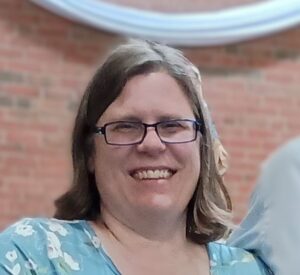I have one of the rarest talents I have come across thus far. Namely, I almost always miss the wastebasket. I could have my hand directly over the top of it and a gust of wind comes out of nowhere inside my house (yeah, right) and the object floats onto the floor. Or, I pushed the flap to the covered trashcan to deposit something inside and the flap swings back and knocks it back out. Other times I practice my rusty basketball shot and miss as well. It seems that no matter how I attempt to dispose of something, I am doomed to fail.
Now this may sound absolutely ridiculous, but it has actually become something that the Lord and I joke about with each other (when I’m done fuming, of course). “Very funny, Lord,” I tell Him. “Ha ha ha ha, I’m not laughing.” I can just imagine him guffawing up there in heaven and slapping His knee. “HA! You missed again! Did you like that wind I conjured up for ya?” And in the end, I usually do end up at least smiling to myself along with Him.
Lately I have been struggling with bedtime prayers with my children and have been talking to them about the importance of having a personal relationship with God. They are always so squirrely, grabbing a toy, starting up side conversations, or simply not paying attention. I tell them that this is the most important time of the day, the time they get to talk to God. At ages 11 and under, I doubt they fully grasp it, but at least I am trying to plant the seeds.
As you are reading this reflection during a time of prayer, I will mention the same to you as well. This is the most important time of your day, the moment you get to talk to God. And that is what Lent is all about, really. A time set apart to foster that personal relationship with God. With only 10 days left until Holy Week, now is a great time to take that effort off the back burner and slide it onto the front burner, allowing God to light your relationship with Him on fire.
Let us not be like the Jews that Jesus is condemning in today’s Gospel. “But you do not want to come to me to have life.” What a tragic day that would be, if we stopped walking toward Jesus! He who “came in the name of [His] Father” is waiting for us with open arms. We simply have to open our own arms and hearts as well in order to receive Him.
So whether it be joking with Jesus about something as silly as missing a trashcan, or crying with Him over the loss of a loved one, I invite you to take your personal relationship with Him one step further. May the remainder of this Lent find you rejoicing in the deepening friendship you encounter with the Savior of the world.
Tengo uno de los talentos más raros que he encontrado hasta ahora. Es decir, casi siempre no atino el cesto de basura. Puedo tener mi mano directamente sobre la tapa y un viento surge de la nada dentro de mi casa (sí, claro) y el objeto flota al suelo. O empujo la tapa del cesto de basura cubierto para depositar algo dentro y la tapa vuelve a su lugar tirándolo afuera. Otras veces practico mi tiro malo de baloncesto y también fallo. Parece que no importa cómo intente deshacerme de algo, estoy condenado al fracaso.
Ahora bien, esto puede sonar absolutamente ridículo, pero en realidad se ha convertido en algo sobre lo que el Señor y yo bromeamos entre nosotros (cuando termino de enojarme, por supuesto). “Muy gracioso, Señor”, le digo. “Jajajaja, no me estoy riendo”. Puedo imaginarlo riéndose a carcajadas allá arriba en el cielo y dándose una palmada en la rodilla. “¡JA! ¡De nuevo no lo metiste!” ¿Te gustó ese viento que conjuré para ti?” Y al final, por lo general termino al menos sonriendo yo también junto con Él.
Últimamente he estado luchando con las oraciones de la noche con mis hijos y les he estado hablando sobre la importancia de tener una relación personal con Dios. Siempre están tan inquietos, agarrando un juguete, iniciando conversaciones secundarias o simplemente no prestando atención. Les digo que este es el momento más importante del día, el momento en que pueden hablar con Dios. A los 12 años y para abajo, dudo que lo entiendan completamente, pero al menos estoy tratando de plantar las semillas.
Mientras lees esta reflexión durante un momento de oración, te mencionaré lo mismo también. Este es el momento más importante de tu día, el momento en que puedes hablar con Dios. Y de eso se trata realmente la Cuaresma. Un tiempo apartado para fomentar esa relación personal con Dios. Con solo 10 días hasta la Semana Santa, ahora sería un gran momento para dejar de lado ese esfuerzo y ponerlo en primer plano, permitiendo que Dios encienda tu relación con Él.
No seamos como los judíos a los que Jesús está condenando en el Evangelio de hoy. “¡Y ustedes no quieren venir a mí para tener vida!” ¡Qué día más trágico sería si dejáramos de caminar hacia Jesús! Aquel que ha “venido en nombre de [Su] Padre” nos está esperando con los brazos abiertos. Simplemente tenemos que abrir nuestros propios brazos y corazones también para recibirlo.
Así que, ya sea bromeando con Jesús sobre algo tan tonto como no meter algo a un bote de basura, o llorando con Él por la pérdida de un ser querido, te invito a llevar tu relación personal con Él un paso más allá. Que el resto de esta Cuaresma te encuentre regocijándote en la amistad cada vez más profunda que encuentras con el Salvador del mundo.
 Tami Urcia is a midwestern gal from a large Catholic family. As a young adulthood she was a missionary in Mexico, where she studied theology and philosophy. After returning stateside bilingual, she gained a variety of work experience, traveled extensively and finished her Bachelor’s Degree at Brescia University. She loves organizing and simplifying things, watching her children play sports, deep conversations with close family and friends and finding unique ways to brighten others’ day with Christ’s love. She works full time at Diocesan in the Software Department and manages the Inspiration Daily reflections. She is also a contributing writer on CatholicMom.com and BlessedIsShe.net.
Tami Urcia is a midwestern gal from a large Catholic family. As a young adulthood she was a missionary in Mexico, where she studied theology and philosophy. After returning stateside bilingual, she gained a variety of work experience, traveled extensively and finished her Bachelor’s Degree at Brescia University. She loves organizing and simplifying things, watching her children play sports, deep conversations with close family and friends and finding unique ways to brighten others’ day with Christ’s love. She works full time at Diocesan in the Software Department and manages the Inspiration Daily reflections. She is also a contributing writer on CatholicMom.com and BlessedIsShe.net.
Feature Image Credit: Samantha Sophia, unsplash.com/photos/boy-reading-holy-bible-while-lying-on-bed-NaWKMlp3tVs
The views and opinions expressed in the Inspiration Daily blog are solely those of the original authors and contributors. These views and opinions do not necessarily represent those of Diocesan, the Diocesan staff, or other contributors to this blog.
The post Deepening our Personal Relationship with God / Profundizar la relación personal con Dios appeared first on Diocesan.

 David Dashiell is a freelance author and editor in the Nashville, Tennessee area. He has three children, a degree in theology, and enjoys writing about philosophy, theology, culture, music, and comedy. You can find his personal blog, Serious Daydreams, on
David Dashiell is a freelance author and editor in the Nashville, Tennessee area. He has three children, a degree in theology, and enjoys writing about philosophy, theology, culture, music, and comedy. You can find his personal blog, Serious Daydreams, on  Nicole Berlucchi is a faith and family blogger (
Nicole Berlucchi is a faith and family blogger (
 Former NPS Park Ranger, Catholic educator, and Youth Minister, Melissa Lucca now spends her days evangelizing family and neighbors as a stay-at-home mom. She holds an MA in Theology from the Augustine Institute and pursues personal study in her spare time. Melissa loves Ignatian Spirituality, Mother Mary, and rock climbing. If you don’t hear her and her kiddo laughing at home, then they are probably out on an adventure!
Former NPS Park Ranger, Catholic educator, and Youth Minister, Melissa Lucca now spends her days evangelizing family and neighbors as a stay-at-home mom. She holds an MA in Theology from the Augustine Institute and pursues personal study in her spare time. Melissa loves Ignatian Spirituality, Mother Mary, and rock climbing. If you don’t hear her and her kiddo laughing at home, then they are probably out on an adventure! Dr. Alexis Dallara-Marsh is a board-certified neurologist who practices in Bergen County, NJ. She is a wife to her best friend, Akeem, and a mother of four little ones on Earth and two others in heaven above.
Dr. Alexis Dallara-Marsh is a board-certified neurologist who practices in Bergen County, NJ. She is a wife to her best friend, Akeem, and a mother of four little ones on Earth and two others in heaven above. Deacon Dan Schneider is a retired general manager of industrial distributors. He and his wife Vicki have been married for over 55 years. They are the parents of eight children and thirty-one grandchildren. He has a degree in Family Life Education from Spring Arbor University. He was ordained a Permanent Deacon in 2002. He has a passion for working with engaged and married couples and his main ministry has been preparing couples for marriage.
Deacon Dan Schneider is a retired general manager of industrial distributors. He and his wife Vicki have been married for over 55 years. They are the parents of eight children and thirty-one grandchildren. He has a degree in Family Life Education from Spring Arbor University. He was ordained a Permanent Deacon in 2002. He has a passion for working with engaged and married couples and his main ministry has been preparing couples for marriage. Pamela Kavanaugh is a grateful wife, mother, and grandmother who has dedicated her professional life to Catholic education. Though she has done her very best to teach her students well in the subjects of language and religion, she knows that she has learned more than she has taught. She lives, teaches, and writes in southwest suburban Chicago.
Pamela Kavanaugh is a grateful wife, mother, and grandmother who has dedicated her professional life to Catholic education. Though she has done her very best to teach her students well in the subjects of language and religion, she knows that she has learned more than she has taught. She lives, teaches, and writes in southwest suburban Chicago. Kathryn Mulderink, MA, is married to Robert, Station Manager for Holy Family Radio. Together they have seven children (including Father Rob), and eleven grandchildren. She is President of the local community of Secular Discalced Carmelites and has published five books and many articles. Over the last 30 years, she has worked as a teacher, headmistress, catechist, Pastoral Associate, and DRE, and as a writer and voice talent for Catholic Radio. Currently, she serves the Church by writing and speaking, and by collaborating with various parishes and to lead others to encounter Christ and engage their faith. Her website is
Kathryn Mulderink, MA, is married to Robert, Station Manager for Holy Family Radio. Together they have seven children (including Father Rob), and eleven grandchildren. She is President of the local community of Secular Discalced Carmelites and has published five books and many articles. Over the last 30 years, she has worked as a teacher, headmistress, catechist, Pastoral Associate, and DRE, and as a writer and voice talent for Catholic Radio. Currently, she serves the Church by writing and speaking, and by collaborating with various parishes and to lead others to encounter Christ and engage their faith. Her website is